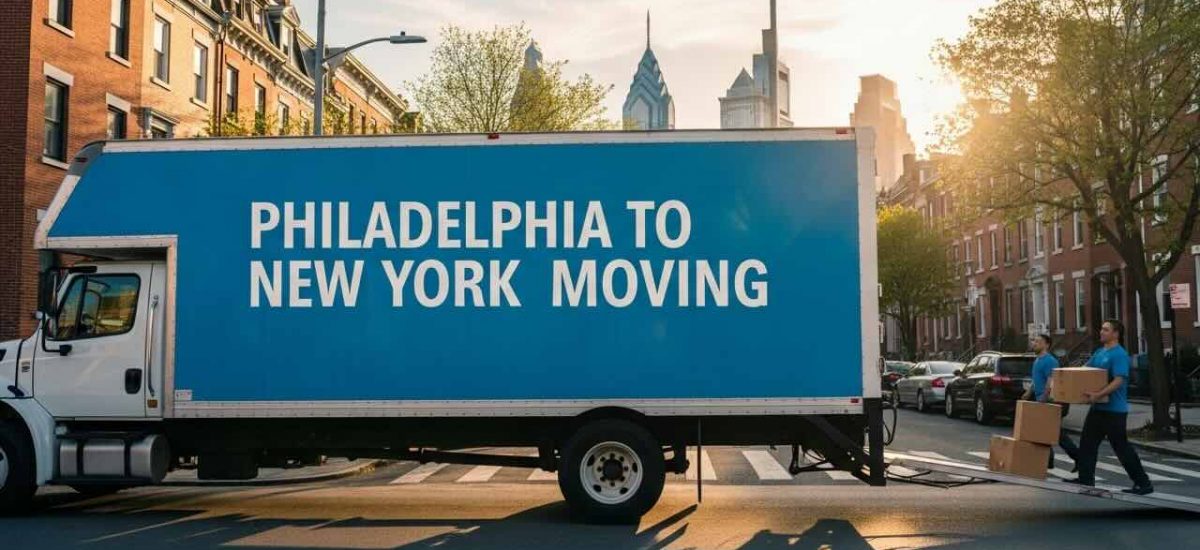The move from Philadelphia to New York is one of the most traveled routes in the Northeast, covering roughly 140 miles and connecting two cities with overlapping industries, transit systems, and cultural networks. Many people make this jump for career opportunities, graduate programs, or simply to experience the intensity and scale that New York offers. The transition is manageable but requires some recalibration around cost, pace, and space.
This guide walks through what changes when you move from Philly to NYC, from the practical logistics of the move itself to the longer-term adjustments in housing, transportation, and daily rhythm. Whether you’re moving to Manhattan, Brooklyn, Queens, or one of the outer boroughs, understanding the differences up front helps you plan better and settle in faster.
Key Points
- Moving costs for a typical two-bedroom apartment from Philly to NYC range from $1,800 to $4,500, depending on the season, truck size, and whether you add packing or storage services.
- Rent in New York averages 40 to 70 percent higher than Philadelphia for comparable space; a $1,600/month two-bedroom in Philly translates to roughly $2,400 to $3,200 in outer-borough NYC neighborhoods.
- Most people shift from car-dependent life in Philly to transit-first living in NYC; monthly MetroCard costs ($132 unlimited) replace car insurance, gas, and parking, but grocery and errand logistics change significantly.
- New York’s lease market moves fast, especially in summer; if you’re targeting a September 1 move, start apartment hunting 4 to 6 weeks ahead and be ready to apply same-day with first month, last month, security deposit, and broker fee (if applicable) in hand.
- Building access and parking permits matter more in NYC; expect to coordinate freight elevator reservations, COI requirements, and street parking permits well in advance of move day.
Distance, Route, and Moving Logistics
Philadelphia to New York is approximately 95 miles as the crow flies, but most moving routes run 130 to 150 miles depending on whether you’re heading to Manhattan, Brooklyn, Queens, or the Bronx. The drive typically takes 2 to 3 hours in light traffic, longer during rush hour or on summer weekends when the New Jersey Turnpike and I-95 corridor slow down.
For moving companies, this distance falls into the “local long-distance” category, meaning many Philly-based movers handle it as an extended day trip rather than a multi-day interstate haul. You can often book a single crew that loads in Philly in the morning and unloads in NYC by late afternoon or early evening, weather and traffic permitting. Some movers price this route hourly with a minimum (6 to 10 hours), while others offer flat-rate quotes based on inventory size.
Truck access is more restrictive in New York than in Philadelphia. Many NYC streets have commercial vehicle restrictions, no-parking zones during business hours, and tight loading dock schedules in apartment buildings. If you’re moving into Manhattan below 96th Street or dense parts of Brooklyn and Queens, confirm with your building whether you need to reserve a freight elevator, obtain a certificate of insurance from the mover, or secure a city parking permit. These requirements are less common in Philly but standard procedure in NYC.
What It Costs to Move from Philly to NYC
The cost of hiring movers for this route depends on household size, time of year, and service level. Here are typical ranges as of 2025:
| Household Size | Estimated Cost (Labor + Truck) | Notes |
|---|---|---|
| Studio / 1-bedroom | $900 to $2,200 | Small truck, 3-person crew, 6 to 8 hours including travel time. |
| 2-bedroom apartment | $1,800 to $4,500 | Medium truck, 3 to 4 movers, 8 to 12 hours; add $400 to $800 for packing services. |
| 3-bedroom house/apartment | $3,200 to $6,500 | Large truck or two trips, 4 to 5 movers, 10 to 14 hours; stairs and long carries increase cost. |
| 4+ bedrooms | $5,000 to $9,000+ | Multiple trucks or shuttle required; may span two days if access is complex. |
Peak season (late May through August, plus end-of-month dates) can push prices 25 to 40 percent higher. Booking mid-week in the off-season (October through April, excluding holidays) often saves money and gives you more crew availability. Additional costs to watch for include long-carry fees (if the truck can’t park within 75 feet of your building entrance), stair charges beyond the first floor, packing materials, valuation insurance upgrades, and storage if there’s a gap between your Philly move-out and NYC move-in dates.
Cost of Living: Philly vs. NYC
The most visible financial shift is housing. Rent in New York City typically runs 40 to 70 percent higher than Philadelphia for similar square footage and neighborhood quality. A $1,400 one-bedroom in Fishtown or Graduate Hospital might cost $2,200 to $2,800 in Astoria or Bed-Stuy, and significantly more in Manhattan or high-demand Brooklyn neighborhoods like Park Slope or Williamsburg.
Here’s a rough comparison of monthly expenses for a single professional or couple:
| Expense Category | Philadelphia (Avg) | New York City (Avg) |
|---|---|---|
| 1-bedroom rent (decent neighborhood) | $1,400 to $1,900 | $2,200 to $3,500 |
| 2-bedroom rent | $1,700 to $2,400 | $2,800 to $4,800 |
| Utilities (electric, gas, internet) | $120 to $180 | $140 to $220 |
| Monthly transit pass | $96 (SEPTA) | $132 (MTA unlimited) |
| Groceries (single person) | $300 to $450 | $400 to $600 |
| Dining out (casual meal) | $12 to $18 | $15 to $25 |
| Gym membership | $30 to $60 | $50 to $120 |
| Car ownership (insurance, gas, parking) | $250 to $450 | $350 to $700 (if keeping car; many don’t) |
Many people offset the higher housing cost by eliminating car ownership. Selling your car before the move removes insurance, gas, registration, and parking expenses, which can save $300 to $500 per month. New York’s transit network covers most daily needs, and ride-shares or Zipcars handle occasional trips outside the subway map.
Another cost to anticipate is the upfront apartment expense. New York landlords and brokers typically require first month’s rent, last month’s rent (or one month security deposit), and a broker fee equal to 12 to 15 percent of annual rent if you use a broker. For a $2,800 apartment, that’s roughly $8,400 to $9,800 due at signing. Some no-fee apartments skip the broker cost, but competition for those units is intense.
Where Philly Residents Tend to Land in NYC
Neighborhood choice depends on budget, commute, and lifestyle priorities. Many people moving from Philadelphia gravitate toward Brooklyn and Queens because the pace and density feel more familiar than Manhattan, and rent is more manageable. Here are some common matches based on what appeals to Philly transplants:
Brooklyn
Park Slope, Carroll Gardens, Cobble Hill: If you lived in Rittenhouse, Queen Village, or Graduate Hospital and want walkable streets, cafes, and green space, these neighborhoods offer similar vibes. Expect higher rent ($2,800 to $4,500 for a one-bedroom) and excellent transit access via the F, G, R, and 2/3 lines.
Bed-Stuy, Crown Heights, Bushwick: Comparable to Fishtown, Northern Liberties, or Brewerytown in terms of artistic energy, diversity, and ongoing development. Rent is lower than North Brooklyn ($2,200 to $3,200 for a one-bedroom), and you’ll find live music venues, street art, and a younger crowd. Transit options include the A/C, J/M/Z, and L trains.
Sunset Park, Bay Ridge, Greenpoint: If you value affordability, neighborhood character, and don’t mind being farther from Midtown, these areas appeal to people who lived in South Philly, Manayunk, or East Passyunk. Rent ranges from $1,900 to $2,800 for a one-bedroom. Commutes run 35 to 50 minutes to Manhattan depending on your destination.
Queens
Astoria, Sunnyside, Long Island City: Queens offers more space for the money, strong immigrant food scenes, and solid transit. Astoria feels similar to Philly neighborhoods with dense commercial corridors, row homes, and corner delis. One-bedroom rents run $2,000 to $2,800. The N/W trains connect you to Manhattan in 20 to 30 minutes.
Forest Hills, Kew Gardens, Rego Park: Quieter, more suburban feel; good for families or people prioritizing space and parks over nightlife. Comparable to Mount Airy or Chestnut Hill in Philly. Rent is lower ($1,800 to $2,500 for a one-bedroom), but commutes to Midtown run 40 to 55 minutes.
Manhattan
Upper East Side, Upper West Side: If your budget allows ($2,800 to $4,500+ for a one-bedroom), these neighborhoods offer classic New York living with museums, Central Park access, and residential streets. Good for people who worked in Center City Philly and want to stay in the center of the action.
East Village, Lower East Side, Hell’s Kitchen: Younger, more nightlife-focused, with smaller apartments and higher density. Comparable to Old City or Northern Liberties energy but amplified. Rent ranges from $2,600 to $4,200 for a one-bedroom.
The Bronx and Staten Island
The Bronx (especially Riverdale, Fordham, and areas near Yankee Stadium) and Staten Island offer the lowest rents in the city ($1,500 to $2,400 for a one-bedroom), but commutes are longer and transit options more limited. These boroughs appeal to families prioritizing space and school access over proximity to Manhattan.
Lifestyle and Cultural Shifts
Moving from Philadelphia to New York involves more than geography. The pace, density, and social rhythms differ in ways that aren’t immediately obvious until you’re navigating them daily.
Transit vs. Car Culture
Philadelphia is a hybrid city where many people own cars and use SEPTA selectively. New York flips that default. Most residents rely on the subway, buses, walking, and bikes for 90 percent of their trips. Parking in NYC is expensive ($300 to $600/month for a garage spot in many neighborhoods), street parking involves alternate-side rules and constant circling, and driving within the city is slower than transit for most routes.
The tradeoff is that errands take longer on foot or transit. Grocery shopping shifts from one big weekly car trip to smaller, more frequent hauls. Many people use delivery services, carts, or granny carts to manage bulk purchases. If you’re used to Costco runs or loading up at Whole Foods in Philly, you’ll adjust to smaller neighborhood bodegas, local markets, and more frequent trips.
Space and Square Footage
Apartments in New York are noticeably smaller than comparable units in Philadelphia. A $2,400 one-bedroom in Philly might be 700 to 850 square feet; the same budget in Brooklyn or Queens gets you 500 to 650 square feet. Closet space, kitchen size, and storage all shrink. Many people downsize furniture before the move or invest in vertical storage solutions, under-bed drawers, and multi-function furniture.
Outdoor space is rare and prized. If you had a backyard, patio, or porch in Philly, you’ll likely lose that in NYC unless you’re willing to pay a significant premium or move farther out. Rooftop access, shared courtyards, or proximity to parks become important filters during apartment hunting.
Social and Professional Pace
New York operates on a faster, more transactional rhythm. Social plans get made and canceled last-minute, professional networking is constant, and the default assumption is that everyone is busy. Philly’s pace is more laid-back; people linger over meals, plans are more reliable, and there’s less ambient pressure to always be “on.”
That intensity can be energizing or exhausting depending on your temperament. Many Philly transplants find they need to actively carve out downtime and say no more often to avoid burnout. The flip side is that New York’s density creates endless opportunities. You can find niche communities, events, and experiences that simply don’t exist at Philadelphia’s scale.
Job Market and Commuting
New York’s job market is larger and more specialized than Philadelphia’s, particularly in finance, media, tech, fashion, advertising, and entertainment. If you’re moving for a specific job, salary adjustments often reflect the higher cost of living. A $75,000 salary in Philly might need to be $95,000 to $110,000 in NYC to maintain similar purchasing power, though exact ratios depend on your field and seniority.
Commuting patterns differ significantly. In Philly, a 30-minute commute often means 8 to 12 miles by car. In NYC, a 30-minute commute might cover only 3 to 6 miles, but you’re on the subway or bus, which changes the experience. Many people read, work, or listen to podcasts during transit commutes, turning travel time into productive or restorative space rather than the stress of driving.
If your job is in Midtown or Lower Manhattan, prioritize neighborhoods with express subway service (the A, D, 4, 5, N, Q lines). Local trains and transfers add 15 to 30 minutes each way, which compounds over weeks. If you’re working remotely or have a flexible schedule, you can live farther out and optimize for space and affordability over commute speed.
Moving with Kids: Schools and Childcare
Families relocating from Philadelphia to New York face different school landscapes. Philadelphia’s public school system is neighborhood-based with some magnet and charter options. New York City’s public school system is larger and more complex, with zoned schools, screened schools, gifted programs, and a high school choice process that requires research and applications.
Elementary school quality varies widely by neighborhood and zone. Many families research school ratings on GreatSchools or Niche before choosing where to live, or they target neighborhoods known for strong public schools (parts of Brooklyn like Park Slope and Carroll Gardens, or Queens neighborhoods like Forest Hills and Bayside). Private school tuition in NYC ranges from $25,000 to $60,000 per year, significantly higher than Philadelphia’s $15,000 to $35,000 range.
Childcare costs also rise. Full-time daycare in Philly averages $12,000 to $18,000 per year; in NYC, expect $18,000 to $30,000 or more depending on the borough and provider type. Nanny shares and co-op preschools are common workarounds, but they require more coordination.
Family-friendly amenities like playgrounds, libraries, and rec centers are plentiful in both cities, but access depends on your neighborhood. Research park proximity, afterschool program availability, and pediatrician networks as part of your apartment search.
When to Move: Timing and Lease Cycles
New York’s rental market has pronounced seasonal peaks. The busiest moving season runs from May through September, with August and early September seeing the highest volume as leases turn over and students arrive for fall semester. If you’re targeting a September 1 lease start, competition is intense and you’ll need to move quickly on apartment applications.
For less competitive hunting and better negotiating power, consider moving between October and April. Winter moves (December through February) offer the most flexibility and sometimes lower rents, though inventory shrinks. Many landlords are more willing to negotiate on rent, waive broker fees, or offer a free month during slower periods.
Start your apartment search 4 to 6 weeks before your desired move-in date. New York rentals move fast; units listed on Monday may be gone by Wednesday. Be prepared to apply same-day if you find a place you like, which means having recent pay stubs, tax returns, bank statements, references, and first/last/security funds ready.
Coordinate your Philadelphia lease end and New York lease start carefully. If there’s a gap, short-term storage or staying with friends may be necessary. If there’s overlap and you’re paying double rent for a few weeks, factor that into your moving budget.
Setting Up Utilities and Services
Utility setup in New York is similar to Philadelphia but with a few borough-specific quirks. ConEdison handles electricity and gas for most of the city; you’ll need to set up an account once your lease is signed. Internet and cable options vary by building; some have exclusive provider agreements, while others allow you to choose from Spectrum, Verizon Fios, or Optimum.
Cell phone service can be spottier in dense neighborhoods or subway stations compared to Philly, though major carriers (Verizon, AT&T, T-Mobile) have improved coverage significantly in recent years. Test your carrier’s signal strength in your new building before committing if you rely heavily on mobile data.
Banking and mail forwarding are straightforward. Most major banks operate in both cities, so you may not need to change accounts. File a USPS change of address form 2 to 3 weeks before your move, and update your driver’s license and voter registration once you’re settled. New York requires new residents to obtain a NY state license within 30 days of establishing residency, though enforcement varies.
NYC Building Access and Moving Requirements
New York apartment buildings, especially in Manhattan and denser Brooklyn neighborhoods, have stricter moving protocols than Philadelphia. Expect to encounter some or all of the following requirements:
- Freight elevator reservations: Buildings with freight elevators require advance booking, often 1 to 2 weeks ahead. Some charge a refundable deposit or hourly fee for elevator holds.
- Certificate of Insurance (COI): Many buildings require the moving company to provide a COI naming the building or management company as additionally insured. Request this from your mover at least 5 to 7 days before the move.
- Street parking permits: If your building lacks a loading dock, you may need a city parking permit for the moving truck. In Manhattan, this often involves applying through the NYC Department of Transportation and can take several days to process.
- Move-in fees or deposits: Some co-ops and condos charge move-in fees ($200 to $500) or require a refundable deposit ($500 to $1,500) to cover potential elevator or common-area damage.
- Building rules: Confirm allowed move-in hours (some buildings restrict moves to weekdays or specific time windows) and whether furniture needs to be wrapped or padded to protect hallways and elevators.
Communicate with both your Philly and NYC building management well in advance. Missing a required permit or COI can delay your move by hours or force rescheduling, which adds cost and stress.
What to Bring, What to Leave Behind
Downsizing before the move saves money and makes settling in easier. Here’s what to reconsider:
Furniture
Large furniture (king beds, sectional sofas, dining tables for eight) often doesn’t fit in smaller NYC apartments or through narrow hallways and staircases. Measure your new space carefully and compare dimensions to your current furniture before packing. Selling oversized pieces in Philly and buying appropriately sized replacements in NYC is often more practical than paying to move furniture that won’t fit.
Car
Unless you’re moving to a car-dependent part of the Bronx or Staten Island, or your job requires a vehicle, consider selling your car before the move. Parking, insurance, and registration costs in NYC often outweigh the convenience, especially if you’re living in a transit-accessible neighborhood.
Seasonal and Outdoor Gear
Bikes, grills, patio furniture, and yard tools lose utility if you’re moving to an apartment without outdoor space or a garage. Storage units in NYC are expensive ($150 to $400/month for a 5×5 or 5×10 unit), so evaluate whether the cost of storing items is worth it compared to replacing them later if your living situation changes.
Kitchen and Household Items
Bring what you use regularly, but skip duplicate small appliances or bulky kitchen gadgets if your new kitchen is significantly smaller. New York apartments often have limited cabinet and counter space, so prioritizing essentials and multi-use tools makes daily life easier.
Pros, Cons, and Tradeoffs
- Pro: New York offers unmatched career opportunities, cultural density, and the scale to support niche communities and interests that don’t reach critical mass in smaller cities.
- Con: Housing costs 40 to 70 percent more for significantly less space; you’ll need to adjust expectations around square footage, outdoor access, and upfront lease expenses.
- Pro: Transit eliminates the need for a car, saving $300 to $500 per month and reducing stress from parking and traffic.
- Con: Errands and grocery shopping take longer on foot or by subway, and you lose the convenience of loading up a trunk for big shopping trips.
- It depends: The faster pace and constant stimulation energize some people and exhaust others. If you thrive on variety and intensity, New York rewards that; if you value slower rhythms and deeper connections, the transition requires intentional boundary-setting.
- It depends: Families gain access to world-class museums, programs, and diversity, but public school navigation is more complex and childcare costs are higher. Private school tuition can be prohibitive without significant salary increases.
FAQ
How much does it cost to move from Philadelphia to New York?
For a typical two-bedroom apartment, expect to pay $1,800 to $4,500 for professional movers, including labor, truck, and travel time. Studio or one-bedroom moves run $900 to $2,200. Costs rise during peak season (late May through August) and for moves requiring packing services, long carries, or storage. Always get binding or not-to-exceed estimates and confirm what’s included.
Should I keep my car when I move to New York?
Most people living in Brooklyn, Queens, or Manhattan find they don’t need a car for daily life. Transit, biking, and occasional ride-shares handle most trips. If you keep a car, budget $300 to $700/month for parking, insurance, and registration. Consider selling before the move unless you’re relocating to a car-dependent neighborhood or your job requires driving.
What’s the best neighborhood in NYC for someone coming from Philly?
It depends on your Philly neighborhood and priorities. If you lived in Rittenhouse or Center City and want walkability and amenities, try Park Slope or the Upper West Side. If you lived in Fishtown or Northern Liberties and value arts and nightlife, consider Bed-Stuy or Bushwick. If affordability and space matter most, look at Astoria, Sunnyside, or Sunset Park. Visit neighborhoods before committing if possible.
How far in advance should I start looking for an NYC apartment?
Start searching 4 to 6 weeks before your desired move-in date. New York rentals move fast, so be prepared to apply within 24 hours of viewing a place you like. Have your financial documents (pay stubs, bank statements, tax returns), references, and first month/last month/security deposit ready. Summer moves (especially September 1) require even faster action due to higher competition.
Do I need a broker to find an apartment in New York?
Not necessarily, but brokers have access to more inventory and can speed up the search if you’re short on time or unfamiliar with neighborhoods. Broker fees typically equal 12 to 15 percent of annual rent. No-fee apartments exist (landlord pays the broker or the building self-manages), but competition is fierce. Websites like StreetEasy, Zillow, and Naked Apartments list both fee and no-fee units.
How does New York’s public school system compare to Philadelphia’s?
Both cities have public school systems with wide quality variation by neighborhood. NYC’s system is larger and includes zoned schools, screened programs, gifted tracks, and a complex high school choice process. Research school ratings and talk to other parents in your target neighborhood. Private school tuition in NYC ($25,000 to $60,000/year) is significantly higher than Philadelphia ($15,000 to $35,000/year). Many families prioritize living in well-rated public school zones to avoid private costs.
Moving Checklist: Philly to NYC Timeline
Breaking the move into phases helps you stay organized and avoid last-minute scrambling. Here’s a typical timeline for a planned relocation:
8 to 12 Weeks Before Move
- Research NYC neighborhoods and create a shortlist based on budget, commute, and lifestyle priorities.
- Start gathering moving quotes from Philadelphia-based companies that service the NYC route; get at least three estimates.
- Review your lease end date and confirm notice requirements with your Philly landlord (typically 60 days).
- Begin decluttering and selling or donating furniture and items that won’t fit in a smaller NYC apartment.
6 to 8 Weeks Before Move
- Book your moving company and confirm the estimate includes travel time, COI provision, and any special handling.
- Start apartment hunting in NYC if you haven’t already; schedule visits for multiple units in a single trip if possible.
- Gather financial documents (pay stubs, bank statements, tax returns, references) for rental applications.
- Notify your Philly landlord in writing of your move-out date and schedule a move-out inspection.
4 to 6 Weeks Before Move
- Apply for NYC apartments as soon as you find one you like; be ready to provide first month, last month, security deposit, and broker fee if applicable.
- Once your lease is signed, request a COI from your moving company if your NYC building requires it.
- Reserve freight elevator access at your NYC building and confirm move-in hours and any fees.
- Order packing supplies (boxes, tape, bubble wrap, markers) and start packing non-essential items room by room.
2 to 4 Weeks Before Move
- Apply for NYC parking permits if needed for the moving truck (Manhattan especially).
- Set up utilities (ConEdison for electric/gas, internet provider) for your NYC apartment move-in date.
- File USPS change of address and update your address with banks, credit cards, subscriptions, and important accounts.
- Confirm moving day details with your crew: pickup time, NYC building access, contact numbers.
- Pack your essentials bag with 24 to 48 hours of necessities (meds, toiletries, chargers, change of clothes, snacks, important documents).
1 Week Before Move
- Finish packing all rooms; label boxes clearly with destination room and contents.
- Defrost and clean your refrigerator if you’re moving it.
- Confirm final details with both your Philly and NYC building management (elevator holds, parking, access codes).
- Arrange childcare or pet care for move day if needed.
- Do a final walk-through of your Philly apartment to ensure nothing is left behind.
Move Day
- Be present for the crew at both origin and destination, or designate someone you trust to manage the process.
- Walk through the inventory checklist with the foreman and verify all boxes and items are logged.
- Keep your essentials bag, valuables, important documents, and medications with you during the move.
- Inspect your Philly apartment for damage and take photos before leaving; do the same at your NYC apartment before the crew unloads.
- Tip the crew if service was satisfactory (typically $40 to $60 per person for this distance).
First Week After Move
- Unpack essentials first: kitchen, bathroom, bedroom setup.
- Test utilities and report any issues to your landlord or utility provider immediately.
- Update your driver’s license and voter registration (NY requires new residents to get a state license within 30 days).
- Locate nearby essentials: grocery stores, pharmacy, laundromat, transit stations.
- Inspect belongings for any damage and document with photos; file claims within the required timeframe (typically 7 to 10 days).
References
- American Moving & Storage Association
- NYC Department of Transportation – Parking Regulations
- Numbeo – Cost of Living Comparison Tool
- NYC Department of Education
- Con Edison – Utilities Setup
- Better Business Bureau – Moving Company Reviews
- StreetEasy – NYC Apartment Listings
Costs, rent ranges, and neighborhood characteristics vary by season, market conditions, and individual circumstances. The figures here reflect 2025 planning estimates and should be verified with current listings and service providers.








